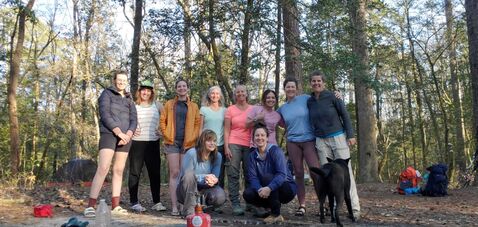 When I was a youth, my volleyball team would encircle our hands placed together in the middle and yell “tenacity!” on the count of three. It was just one of many things we shouted together as a demonstration of teamwork; I never thought too hard about it. We were a scrappy little team from a tiny town with little opportunity for early skills development. But we had tenacity. We went up against those big schools with their big-name coaches and their players that had been playing since they were knee high to a grasshopper (in our small town lingo), and we held our own. We would return to our tiny town and regale everyone with stories of how we scraped by in this match, or barely saved that match, how we avoided this team’s big time blocker, or fielded that team’s powerful smashes. The challenges we overcame. The hard won red-faced smiles. I thought about this recently while backpacking on the Neusiok Trail in eastern North Carolina with a group of women. This trail, that traverses highways, and incorporates some gravel roads into its length, is mostly suffering for some vague notion of comradery. Mutual suffering, that is. There were no long rewarding vistas, hardly any interesting plants, nothing but aching feet and mud soaked clothes, and a few bloody thorn wounds. But still, I would do it again. There’s something enticing about mutual suffering—the accomplishment of making it through. The hard won red-faced smiles. It's not unlike, I suppose, the hazing of brotherhoods. The closeness you feel to those who went through it with you. There is purpose to such madness, though it is never quite realized until after the fact, I think. Adversity is the story we tell, after all. With none such adversity, our lives might be quite content, indeed, but suffer instead from a dearth of stories. And since we’re made almost entirely of our stories, we must create adversity in its absence so that we become something. So, we take on unnecessary challenges like backpacking untold miles, trekking to the ends of the earth, climbing mountains, and the like. Challenges that, once overcome, result in hard won red-faced smiles. Smiles that contain the value of adversity, even manufactured adversity. This is true in our farming career as well. Farming can get rather routine and boring when everything goes according to plan. Fortunately, never does everything go according to plan when one is working with nature. Instead, we have plenty of stories to tell. We reminisce of high winds blowing down structures, floods washing away crops, the scrambles to protect sensitive crops from hard late freezes, and, yes, after we overcame those adversities together, the hard won red-faced smiles.
0 Comments
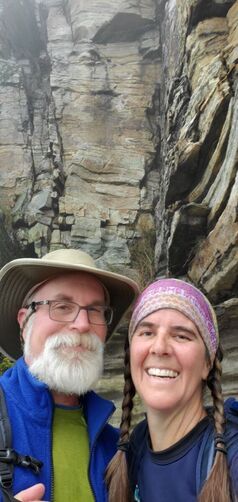 I assert that the invention of the selfie is the fount of discord. I’m not alleging that before the advent of selfies that we lived in a harmonious utopian society. Perhaps what I mean to say is the selfie is the fount of the exacerbation of discord. “The great divide”- The illusion of extreme polarization that plagues us in current times. I’m not one who buys into that particular myth, but the very existence of the myth is the heart of the matter here. And the selfie is my metaphorical scapegoat for the larger problem that we have ceased to interact with one another. It used to be (and I am plenty old enough to remember), then when you wished to have your photo taken in front of some wonder of the world, you would ask a someone else to take it. You would interact with a stranger. Or if you were lost, say, in a foreign town, you would stop and ask a stranger for directions. Or if you were baking and were a bit short of sugar, you would walk over to the neighbor’s house with your cup and ask if they might lend you a bit of sugar. And then later, you might bring them a cookie or two as thanks. Or if your were stopped on the side of the road for any reason, a local would stop to offer assistance. My point is that we used to interact with each other in a human capacity over mundane things. Human things. And technology, as convenient as we find it, has removed this need for each other. Without such need, we can easily fail to see the sameness in each other. We don’t see the smiling neighbor who graciously lets us into their home to borrow a cup of sugar, or the kind stranger who does their best to take a great photo of us in front of the corn palace, or the nice lady who gives us directions in the local dialect that includes things such as “where the Piggly Wiggly used to be”, or the helpful local who stops to help us change a flat tire. And we don’t get to be the smiling neighbor, or the kind stranger, or the nice lady, or the helpful local. Without these mundane commonalities, it becomes frighteningly easy to put each other into mythical boxes. This one is red. This one is blue. As if that were the entirety of our composition. I, for one, think I am larger than my political beliefs. In fact, I think my political beliefs-which waver and change over time and with new information and experiences (they are called “beliefs” for a reason, after all)-make up only a tiny portion of who I am. I am also the smiling neighbor, the kind stranger, the nice lady, and the helpful local. And I’m betting you are too. But now, with our faces glued to our devices (chasing our own tails in our social media echo chambers), and our needs met by technology, the people around us become two-dimensional without our ever looking up to notice. When we fail to notice these plebeian congruences, it is the metaphorical tip of the iceberg. If we don’t see the tip, we most assuredly cannot fathom the depths of similarities between us hidden below the surface. I am not asserting this from some high horse. I am just as guilty. Why just today I passed a clean white Cadillac Escalade stopped on the side of the road without stopping to offer assistance. It wasn’t until I was halfway down the road that I realized I had subconsciously made the assumption that they did not need my help and wouldn’t have appreciated my offer to do so. Maybe I could have helped, maybe not? Maybe they would have appreciated it, maybe not. But even an offer to help would have been more human connection than simply driving on by under my assumptions, without stopping to consider the actual real humans inside that car.. Technology has altered our brains and it’s going to take a herculean effort to remember our own three-dimensionality, put down the phone, and once again interact with strangers. To find again our mundane human commonalities and to let each other out of the boxes we've forged for one another. My selfies are never any good anyway. 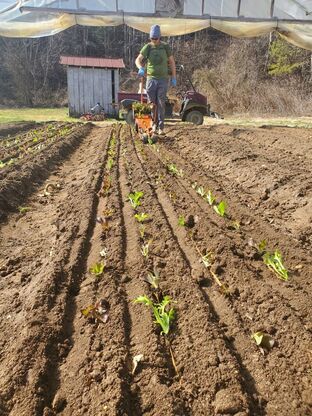 I’ve been living by two mantras recently. Or rather, I’ve been trying to live by two mantras recently: "there is freedom in discipline" (Anna Lavesque), and "prioritizing goals over moods" (Adam Grant). The latter: "whether you aim to get in shape, learn the guitar, or write a book, the question is not whether you feel like it today. It's who you want to become tomorrow. Enthusiasm fluctuates. Consistent action accumulates." Freedom is discipline means that consistent action and practice- doing the work- leads to an increased ability (more freedom) to do what you want to do. Like getting my butt out of bed each morning to stretch give me the flexibility and strength to do the things I want to do well into old age. I mean, I paddled a river with a bunch 70+ year olds the other day and I thought, “yes! I want to be able to keep doing this, and here is my model.” But it requires discipline to keep my body going and at my age, it require daily discipline in movement and lots of practice. Remember when we were in our twenties and we could eat and drink whatever we wanted, stay up all night and sleep until noon, and be pretty much the same functional person? Little did we know how good we had it back then. I mean, I’ve found that while there’s so much more joy and much less angst in middle age, the body seems to feel every tiny little thing. Oh, you drank 1 fewer glasses of water than you needed yesterday? How about cramps, or a headache. Oh, you gave in to pizza and beer yesterday? How about constipation, or a headache, or general lethargy. You get the picture. So even though I know how I will be affected by skipping out on the “maintenance”, sometimes the warm cozy bed just disagrees with discipline. Sometimes, the mood dominates. Because ultimately, no one is checking. No one is holding judgement. No one is grading my performance. Except, perhaps, myself, and I’m just not that harsh. I rationalize, make excuses, justify, and just don’t harass myself as much as I probably should. Sometimes, it’s easier to live in the present (it’s all the rage after all), and forget, for a moment, who we want to be tomorrow, and think only of who we are right now-cozy, warm, and in bed with a snuggly cat on our feet. I can always pick up the mantras again tomorrow. After all, tomorrow is a new day. Herein lies the conflict of life lessons. If we are to live each day as if it were our last, why on earth would we spend so much time on maintenance? For what purpose are we maintaining? But if we don’t maintain, and do, in fact, live to see tomorrow, that tomorrow could feel pretty rough if we don’t maintain. And so we heave a big sigh, remove our feet from beneath our snuggly cat, push ourselves out of bed, and do the damn maintenance, and plan a fun thing for tomorrow that will benefit from this maintenance.  Here's what video games have to teach our children (or us, for that matter): growth mindset, skill building, persistence, and tenacity. Yep, I said that. Video games have useful things to teach us. In the world of video games, you must constantly learn new tricks, routes, moves, etc. in order to move past the challenge. You must build skills through experience in order to level up. In this, you are developing a growth mindset. You don't begin a game expecting to be at level 6000. You know that you must "do the work"-complete the tasks of lower levels-to get to the big stuff. And you don't do that by playing one time. Nope. You know that you will need to return again and again to the game in order to gradually level up. You will be persistent. Why? Because leveling up is the reward. You're not paid for this (or, at least not generally), you're not given a tangible prize. But just building the skills and being better than you were the day before is its own reward. When I was a teenager, my brother obtained a Sega game system which came with the game "Sonic the Hedgehog". I played that game tenaciously, probably daily, for more hours than anyone would think was healthy. There were only the very basic instructions (this button does this, that button does that), but as I played again and again, I learned special tricks, secret routes, how to beat this challenge and that level-the dopamine surging every time I leveled up. Until eventually, I beat the entire game. What did I do then? Declare myself a champion and bask in my glory? Nope. I began again, moving a little quicker through the levels each time, until I could beat the entire game consistently. I'm sure this isn't the only thing that taught me a growth mindset, but I'm not about to discount the role Sonic the Hedgehog played in my brain development. Later in life, people marveled at how I moved through the stages of language learning, from babbling incoherently like an infant to carrying on conversations, but I learned how to do this from video games. I knew I wasn't inherently good at language learning (fixed mindset), but I knew I had to be persistent-tenacious-to "level up." I knew I had to complete the slow babbling beginner levels, build skills, learn the tricks and secrets in order to communicate. It was just like Sonic the Hedgehog. I had plenty of game overs on the way to successful(ish) communication. I wasn't any more "natural" at it than others, I just did it more. I carried a notebook and pen on a lanyard around my neck to write down new vocabulary words. Instead of hanging out with the other English speakers, I would wander around and try to talk to the locals. I would fumble, stall, misunderstand, say inappropriate things accidentally, and fall into bed exhausted at night knowing that I was a tiny bit better today than I was yesterday. This practice has informed my entire life. It’s how I farm, it's how I play, it’s how I paddle, it’s how I live. So, poo-poo video games all you want, and I’m not saying we should live our lives inside a video game (that can’t be good for our eyes right?), but I do think Sonic the Hedgehog played a positive roll in my education. 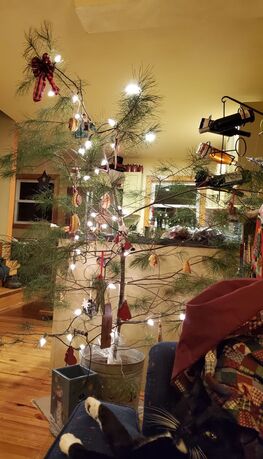 We didn't take any drunken selfies, so here's our Christmas tree, which might give you the same impression We didn't take any drunken selfies, so here's our Christmas tree, which might give you the same impression Jason and I don’t spend much time apart. It’s the nature of living and working together. While intimate knowledge of each other is an innate part of marriage, it’s a bit more, say, pronounced in ours. Not only do we know what makes each other tick, we know exactly when we’re going to tick and all the background info that went into each tick. As intense as it is, you get used to that sort of thing. Eventually, that kind of transparency becomes a comfort, and something that you sort of take for granted, until…well you know the cliché. So I headed off to visit my family in Michigan alone while Jason attended a retreat in Maryland with a bunch of strangers (or, at least they started off strangers). The thing about family is that you know them and love them and they know and love you, but it lacks the intensity—the transparency—that I’ve grown accustomed to in my marriage. I don’t mean to say that this is a bad thing—after years apart growing in our own directions, I highly doubt the same kind of intensity or transparency would be beneficial. I mean, my family is intimately (and dare I say intensely) aware of a distant part of me. It is not an unimportant part of me—they know how I came to be. They even created some of that. And to a certain extent, I know them. But childhood is an innately selfish existence. You don’t really know the people in your life outside of their relationship to you. Once they release you to the wild unknowns of the world to continue “becoming”, it all gets a little more nebulous. You fill each other in on the major plot points on the phone or during brief visits, but you don’t see all the background information that led up to the plot points. You no longer truly see each other. So, after three and a half days apart, Jason and I found ourselves reunited and reacquainted with the transparency of each other…and within walking distance to the little quaint downtown and its neighborhood bars. It was an instant celebration. We laughed hard enough to push tears into out of our eyes and delighted in the presence of being truly seen and truly seeing. We were drunk on love. All of this delight and celebration led to more of the same until we accidentally were drunk on more than just our love and found ourselves stumbling along the unrecognizable streets of my childhood home to sheepishly shuffle up to bed like guilty teenagers with no more than a quick wave to my befuddled parents, who hadn’t borne witness to the background details that led us to this abashed plot point. 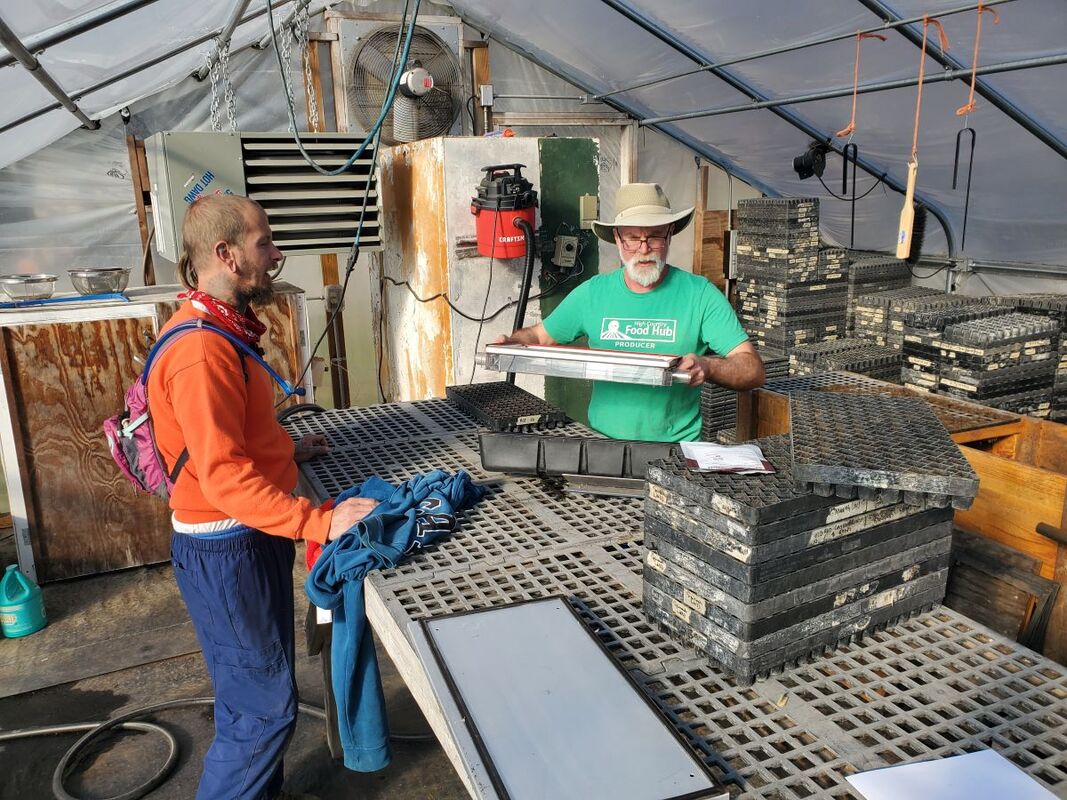 We are still harvesting crops for markets. We are still deconstructing, cleaning up, and putting away the debris of this year’s season. We are still “putting the farm to bed”. We are still planning next year’s crops. But in the greenhouse, the next season has already begun. In the greenhouse, we are already sowing the seeds of next season’s fruits. In the greenhouse, we have already moved past this year’s mistakes and heartbreaks and into the swelling hope of the new year. This is the farm life. This is the cyclical nature of things: the sped-up version of birth, growth, decline, death, decay, rebirth. That even when things get crazy around us, even when we’re cleaning up the wreckage, we still have to stop and sow the seeds of the crops we wish to reap-a, everlasting metaphor for our human lives. 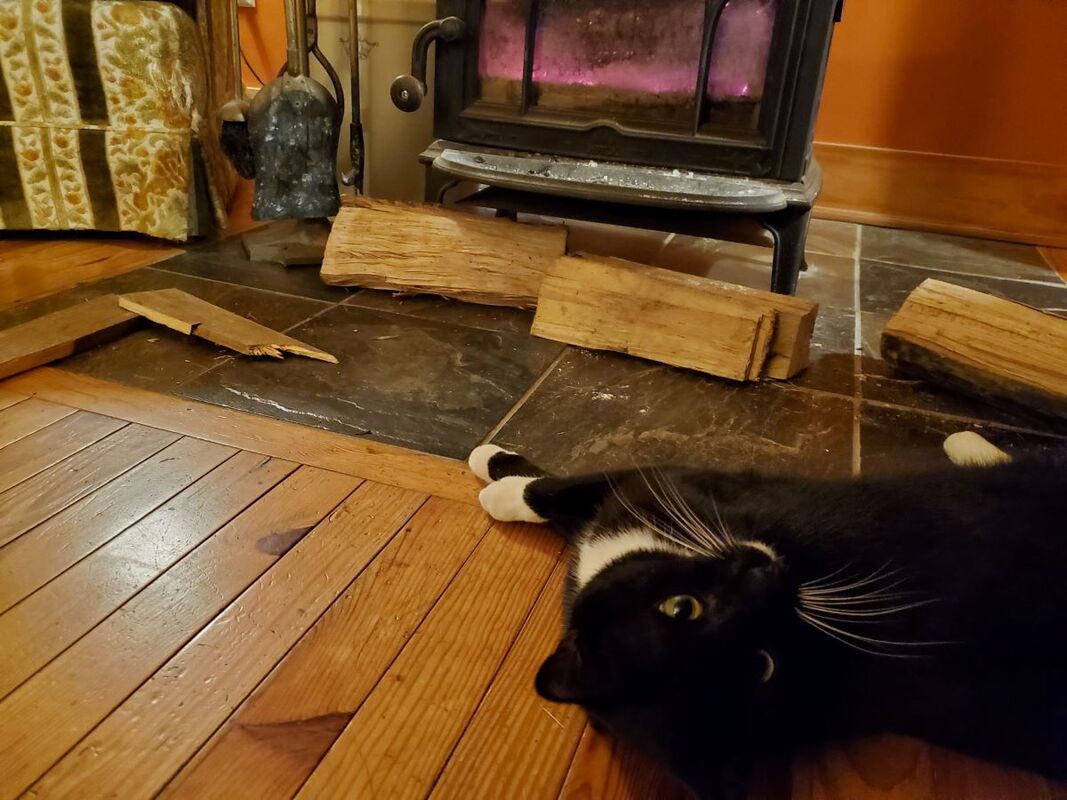 With darkness arriving at 5pm, it feels like the earth has slowed its spinning. My circadian rhythm has me, with nothing pressing to do in the dark, learning to read again. I don’t mean, of course, that I actually lost the skill of reading, I just lost the time to keep my eyes open enough to read more than a paragraph or two. This is the nature of seasonality and we are lucky enough to live within its confines. It’s one of the things I love about my job. With schedule dictated by the sun and the relative warmth it creates (no need to rise at 5am since it’s too cold to get anything done outside until 9 or 10), I get to rediscover the pleasure of books each winter. I’ve already plowed through several books this season and we’re still harvesting and packing for markets! I’m three books ahead of our book club reading, which usually has been scrambling to finish or even get it half read before the gathering. Each morning I wake up (not at 5), completely rested, despite staying “up late” (like 9 or 10pm) reading into the night. This is what makes the spring and summer worth it. Those 6-day work weeks, trying to cram some fun and all the house/yardwork into Sundays. The early mornings and late evenings. The struggle to keep sane. It’s all about this time here in front of the woodstove, a kitten on my feet, and a book in my hands. This is the balance that winter brings to us, and I am ever so grateful for it. 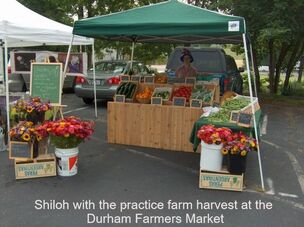 “You can’t go home again because home has ceased to exist except in the mothballs of memory” wrote John Steinbeck in Travels with Charley. Now, I didn’t grow up in North Carolina from birth, but I did “grow up” so to speak in my farming career in central Piedmont North Carolina. I took sustainable farming classes at Central Carolina Community College, worked for Peregrine Farm and EcoFarm and Weaver Street and Chatham Marketplace there in the triangle of North Carolina, got to know all our mentor farmers there, and even had a little “practice farm” on borrowed land with borrowed equipment where we sold our meager harvests at the Durham, Hillsborough, and Fearrington farmers markets. We were very involved in the local food and ag community there. So, in a large sense, central North Carolina has loomed large as our farm “home”. We left 17 years ago, not for greener pastures so much as for bigger hills, wilder rivers, and fresher more open markets where we could grow with the marketplace, or at least a smaller pond where we could appear to be bigger fish. I returned “home” this past weekend to attend a local agriculture conference that I hadn’t attended in over a decade. This conference played a large part in my early farming career, and even though I would have told you I had no expectations, I found myself dazed in a completely unrecognizable place. I barely recognized a face in a crowd where I once knew everyone. The only people there that knew me had grey hair. All my mentors were retired; my peers, either moved on or too busy farming to attend this conference. The community I remembered had just lost one my oldest farm friends and mentors, and very few people there seemed to even know him. I was a stranger in a strange land. There I stood, in a city once empty of people except panhandlers, now brimming with hip young vibrancy, at a conference once known for its, shall we say “hippiness”, now teeming with professional high caliber content, an older-perhaps obsolete-model of my enthusiastic budding farmer self of yesteryear. It’s an age-old story: the mothballs of memory, indeed. A decade of dirt now covered my footsteps here. Without google maps, I wouldn’t have recognized the paths I once tread. Reading over this, it seems tinged with a bit of sadness, which, I suppose is honest—it’s weird to return to an unrecognizable home—but also not the complete story. There is also comfort and satisfaction to see an enthusiastic crop of budding new farmers coming up through a much more sophisticated and professional system of education. A feeling like, “yes, these kids are going to be just fine”—a sense of relief that we’re leaving the land and our food supply in capable hands. There’s also the reassurance that our mentor farmers can retire. Farmers can retire! This is not necessarily a “till death do we part” career! And, there’s the excitement of new adventures to come in my “new” home where I’ve been growing (both figuratively and literally) over the past 17 years. So, as always in the life of a Libra, there is balance. A bittersweet return to the mothballs of memory. 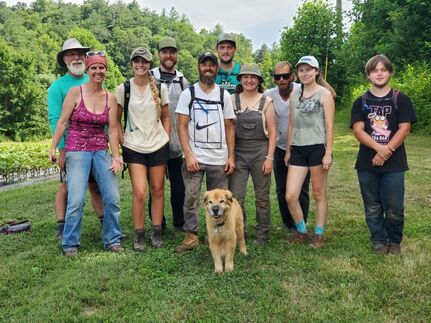 When you've been doing something a long time, even if you love it, even if you love it for all the right reasons, you can fall into a routine that might feel sometimes like a rut. You forget to pay attention to the delights, to the glimmers, to the reasons you love it. Then along comes someone who reminds you that there is poetry everywhere here in this place and in what we do here. This season, that person was Holly. And so, in honor of that, I'm featuring a poem she wrote. Enjoy! Meet out in the green beans, SE6 It was mid July when I first learned that one of life's greatest joys, is snapping okra at the collar. Down in the hollar, fog settles into the valley like the bodies of two lovers And I am convinced, That everything, and everyone, looks best dressed up in the morning dew From the fennel fronds, to me and you. Mid morning, and we're all out in the green beans, Talking about horoscopes and Hardee's, Origins and endings. Discussing religion in all its forms, because what's more sacred than the feel of dirt between your fingers and sunlight on your skin. I am drenched in summertime abundance, Dripping in the kind of sweat that the body craves That leaves behind nothing but Salt and satisfaction. Late afternoon light floods the farm, and a part of me I never knew was lost, comes home again. -Holly Agnew 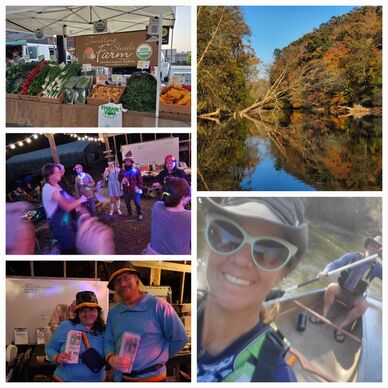 The world is a conflicted place. The tiny insignificant speck of our lives juxtaposed against the infinite universe causes a great rolling of the eyes as we cry in the shower (or the walk-in—if you know, you know), over our silly little human problems. But narrow down the focus and those problems become tangible suffering to our momentary selves. The shit gets real, so to speak. And difficult. Still, I contend that we have not only the right to our own joy, but an obligation to it. After all, we are the way (the only way as far as we know) the universe reflects upon itself, and wouldn’t it be a travesty for the tragedy to outweigh the joy. What good is a depressed universe? It is for the great tragedies of the world that I become so committed to joy. We have to maintain some semblance of balance so as not to shift the universe into a darker more somber place. There must be light to balance out the dark. There must be weightlessness to balance out the gravity. It is a serious undertaking, this commitment to joy and light and weightlessness. It takes effort and discipline and-quit rolling your eyes! I’m serious—practice. Have you tried focusing on a beautiful sunrise in a war zone? Pushing past a heavy veil of grief to find the laughter beyond? It’s not always easy to find the joy. But it looks to me like there’s plenty of darkness to go around, and so I, for one, am choosing to play for the other team. Even when it takes effort and discipline and practice. I might not always excel, but for the universe’s sake (okay, okay, and for mine), I’m going to do my very best. |
AuthorWrite something about yourself. No need to be fancy, just an overview. Archives
July 2024
Categories |

 RSS Feed
RSS Feed